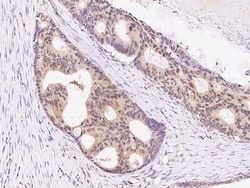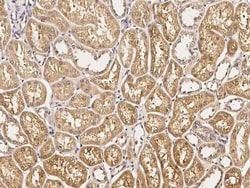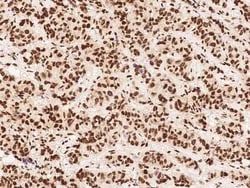IKK alpha Antibody, Novus Biologicals™
Rabbit Polyclonal Antibody
Manufacturer: Fischer Scientific
The price for this product is unavailable. Please request a quote
Antigen
IKK alpha
Applications
Immunofluorescence, Immunohistochemistry (Paraffin)
Conjugate
Unconjugated
Host Species
Rabbit
Research Discipline
Cancer, DNA Repair, DNA replication Transcription Translation and Splicing, Immunology, Innate Immunity, mTOR Pathway, Protein Kinase, Signal Transduction
Formulation
0.2 μm filtered solution in PBS
Gene ID (Entrez)
1147
Isotype
IgG
Purification Method
Antigen and protein A Affinity-purified
Dilution
Immunocytochemistry/Immunofluorescence 1:100-1:500, Immunohistochemistry-Paraffin 1:200-1:1000
Classification
Polyclonal
Form
Purified
Regulatory Status
RUO
Target Species
Human
Gene Alias
conserved helix-loop-helix ubiquitous kinaseIKBKA, EC 2.7.11, EC 2.7.11.10, IkappaB kinase, I-kappa-B kinase 1, I-kappa-B kinase alpha, IkBKA, IKK1I-kappa-B kinase-alpha, IKK-A, IKKAIkB kinase alpha subunit, IKK-alphainhibitor of nuclear factor kappa-B kinase subunit alpha, NFKBIKAIKK-a kinase, Nuclear factor NFkappaB inhibitor kinase alpha, Nuclear factor NF-kappa-B inhibitor kinase alpha, TCF16, TCF-16, Transcription factor 16
Immunogen
Produced in rabbits immunized with a synthetic peptide corresponding to the N-terminus of the Human IKK alpha.
Primary or Secondary
Primary
Content And Storage
Store at 4°C short term. Aliquot and store at -20°C long term. Avoid freeze-thaw cycles.
Description
- IKK alpha Polyclonal antibody specifically detects IKK alpha in Human samples
- It is validated for Immunocytochemistry/ Immunofluorescence, Immunohistochemistry (Paraffin)



